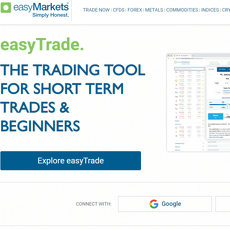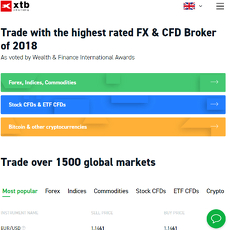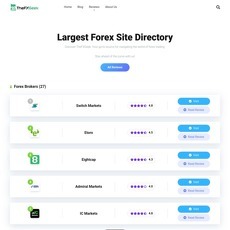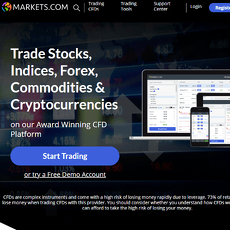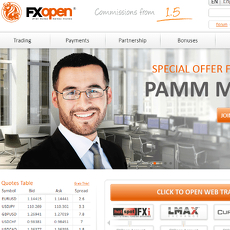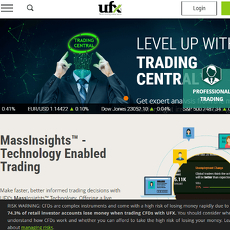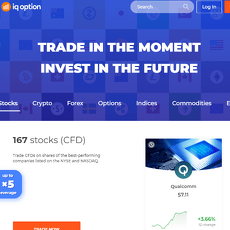eToro Review
eToro
www.etoro.com
Is eToro Really As Good as It Sounds? Let's Uncover the Hidden Problems First!
Have you ever seen one of eToro's shiny ads and wondered, "Is it really as amazing as it sounds?" Trust me, I've been there too. It’s tempting, isn't it? They promise you intuitive trading tools, online social trading, easy-to-understand investments—all wrapped up in user-friendly package. But hold up a second—before you click “sign up,” wouldn’t it be better to first figure out what's really going on behind those slick marketing campaigns?
Let's be realistic here: every trading platform, no matter how reputable, has its flaws. Knowing these issues beforehand can literally save you time, money, and quite honestly, your stress levels. So—yeah, I'm going to start off by highlighting the common bumps in the road traders often face with eToro first. Why sugarcoat, right?
What Issues Do People Face With eToro?
First things first—fees. They're not exactly hidden, but they do tend to catch new users off guard. Here’s a quick snapshot of common fee-related complaints I've observed:
- Withdrawal Fees
- Sure, withdrawing your profits seems straightforward at first—but did you know eToro charges a flat $5 withdrawal fee each time? Doesn’t matter if you're withdrawing $20 or $2,000, it's always that same $5 bite. These fees may seem minimal at first, but for frequent traders or small investors, they can really add up.
- Currency Conversion Charges
- If your deposit isn't in USD, eToro automatically converts your money into dollars. Not bad, except there's a sneaky conversion fee that typically sits around 0.5% to 1%. That may sound small—but say you're frequently adding funds or trading big amounts, those conversion fees can hurt your returns significantly over time. Ouch!
- Inactivity Fees
- Did you hear about their "inactive" account fee? If your account sits idle for more than 12 months, eToro deducts $10 monthly. Yeah, they're actually charging users for NOT trading. Seems a bit odd indeed, especially if you're planning a long-term, steady strategy.
Another potential issue traders have brought up is the Customer Service Response Time. While customer support exists, you might face slow responses or generic replies, especially during heavy market fluctuations when the support team gets overwhelmed. Imagine facing an urgent issue during high volatility periods only to be stuck on support-hold. Doesn't sound fun, right?
On a more serious note: Account Limitation & Suspension controversies have occasionally popped up. Though it's not widespread, some eToro users reportedly had their accounts frozen unexpectedly without a clear explanation or with a frustratingly slow recovery process. While it doesn't happen often, it's worth mentioning—better safe than sorry.
"My account was randomly suspended right when Bitcoin prices were peaking. Their support team took days to reply—I was literally helpless." — A frustrated trader on Trustpilot
Situations like this speak pretty loudly, don't they?
Don't Worry, There's Always a Way
Okay, before you panic and swear off eToro, here's some good news: None of these issues are unavoidable if you know the rules before hopping into their system. Educating yourself upfront means you can strategically manage these challenges.
For instance, knowing in advance allows you to plan fewer withdrawals or maintain activity to dodge certain fees. It could also mean keeping your initial deposit in USD if possible or being savvy with currency exchange rates. And yes, even customer support limitations can be mitigated by careful monitoring of your account or joining eToro community forums to seek immediate help.
The truth is, every trading provider out there has its pros and cons. The key is simply knowing what they are, and adapting to reduce friction points.
Ready to learn more details on how eToro operates to see if it matches your trading style? Let’s jump over and find out exactly What eToro is Anyway?
What Exactly is eToro, Anyway? A Quick Walkthrough
Before deciding if a crypto platform is right for us, let’s slow down for a second and find out exactly what kind of animal eToro really is. Let's quickly unpack what makes it tick and what you really get when you sign up.
A Brief Overview
eToro isn't a newcomer to the trading world—in fact, it’s been around since 2007. Yep, it's older than Bitcoin itself (which emerged in 2009). But eToro didn't jump immediately into crypto. Initially, the platform's roots were geared towards forex, commodities, and stocks. Nowadays, they've built quite the reputation as a "social trading" platform; in other words, it's like a blend between trading and investing on one side, and Facebook-style interactions with fellow traders on the other.
What sets eToro apart at first glance?
- Copy Trading: Ever wished you could peek over the shoulder of a successful trader and replicate their moves without lifting a finger? That's precisely what eToro's CopyTrader feature allows. You pick successful investors who's track record impresses you, set your parameters, and let the software do the rest. Easy peasy.
- Social Aspect: Forget trading solo—eToro lets you chat, share strategies, and get insights from other traders in a lively community atmosphere. You can post your trades and even comment on your friends' activity, similar to how you'd chat on Instagram or Twitter.
- Crypto and Beyond: Besides over 70 cryptocurrencies like BTC, ETH, XRP, eToro lets you diversify into other assets like stocks, commodities, and currencies—including giants like Apple, Amazon, or even Gold. Handy if you're looking beyond crypto.
"The best investment you can make is in education." – Warren Buffett
Think of eToro as merging educational value with practical investing. By following and copying experienced traders, you're not just potentially increasing your profit margins, you're practically enrolled in a 24/7 live trading school.
How User-Friendly is the eToro Interface?
Nobody likes to waste time trying to figure out a complicated interface, especially when there’s money—and your sanity—on the line. Thankfully, eToro offers a refreshingly clean, intuitive trading experience. Whether you're a seasoned investor or you barely know the difference between "bull" and "bear" markets, you'll likely find eToro’s platform a comfortable fit.
- Layout: The interface is sleek and straightforward, far less intimidating than traditional stockbroking sites or even some crypto exchanges overloaded with technical jargon.
- Mobile App: Perfectly optimized for mobile, eToro's app performs smoothly on Android and iOS—one-hand trading while sipping coffee is actually realistic on this platform. According to recent app store data, eToro boasts a rating higher than 4 stars—pretty reassuring, right?
- Charts and Tools: Even though it’s beginner-friendly, advanced traders aren't left out. Detailed charts, multiple indicators, and One Click Trading are easily available for those who crave a deeper analytical edge.
Countries Supported by eToro
Before you rush in, let's check if your country is invited to the eToro party. Currently, eToro operates in over 100 countries worldwide—but sadly, not everywhere. Regulations can restrict access for residents of certain regions.
- Available In: Europe (UK, Germany, France, etc.), the majority of Asia-Pacific countries, parts of Latin America, Australia, and major parts of Africa (like South Africa).
- Unavailable In: Countries like Canada, Cuba, North Korea, Japan, Syria, Iran, and Sudan can't currently use the platform. The United States has limited availability depending on specific states and available features due to regulatory reasons.
Always confirm your country status on eToro's own site first to avoid disappointment or unnecessary headache down the road.
But there's more to consider besides where you live. Sure, eToro looks inviting on the surface—but exactly how high does the pricing bar go? Are there hidden catches or fees you should worry about?
Wondering about the true costs? Stay with me, because next, we’ll pull back the curtain and unveil the genuine, transparent price tags tied to using eToro. Let’s find out exactly how much you might end up paying...
Understanding the Real Costs: How Much Does It Actually Cost to Use eToro?
We all know the feeling: you see an exciting new trading platform, everything's appealing, the promises sound amazing—but you can't shake a nagging worry about hidden charges. It's totally understandable. No one wants unexpected costs stealing away their crypto gains. So, let's cut through the noise and clarify exactly what you'll be paying when you trade crypto using eToro.
Hidden and Not-So-Hidden Fees
You might've already heard some murmurs about eToro's fee structure—traders either really love it or openly grumble about it. I'll get real upfront about this because transparency matters. Here's what you'll probably encounter:
- Trading Fees and Spreads: One big thing people overlook when scrolling through eye-catching crypto pairs is the spread, the price difference between buying and selling. Unlike competitors who charge flat percentages or fixed commissions, eToro wraps its trading cost within the "spread". For example, the spread for popular crypto like BTC usually hovers around 0.75%. Sounds fair enough, right? Maybe, but things change heavily depending on the cryptocurrency: altcoins can have spreads as high as 4.5% or even higher. Always keep an eye out for this—otherwise, you may start to question where your crypto profits vanished to!
- Withdrawal Charges: Ah, the unpopular kid on the block! eToro charges you a flat rate of $5 per withdrawal, no matter how much you're taking out—even if you withdraw a small amount like $20 worth of crypto! This small fee can feel frustrating, especially if you're used to no-fee withdrawal cryptocurrency exchanges like Binance or Coinbase (depending on your method). Consider wisely when and how much you withdraw, because frequent smaller withdrawals will start nibbling your gains away bit by bit.
- Currency Conversion: Trading crypto can already feel complex, but often eToro also imposes fees for currency conversions—which happens when depositing and withdrawing your funds in currencies other than USD. These fees range roughly from 50 to 250 "PIPs" (Percentage In Points) or approximately 0.5% to 2.5%. It’s like paying a small toll fee whenever your money goes in or out in another currency—just like travel money exchanges at airports, you're paying the "crypto traveler's tax."
- Inactivity Fee: A particularly sneaky one that lurks unnoticed! After 12 months without logging into your eToro account, you'll start paying a monthly inactivity fee of $10. No one likes surprising charges, so if you stop using eToro, at least remember to close your account or periodically log in to save yourself that extra $120 a year.
"Beware of little expenses; a small leak can sink a great ship." – Benjamin Franklin
These fees may individually seem minor, but overtime, they eat into profits significantly. And as Mr. Franklin said (and he knew his way around money!), even tiny leaks can drain away your crypto success.
Comparing eToro's Fees with Other Popular Crypto Platforms
Alright, time for the burning question everyone asks: how does eToro actually stack against competitors fee-wise?
- eToro vs Coinbase:Coinbase usually nails traders with flat percentage fees (around 1-3% per trade for their standard platform), potentially pricier per trade than eToro on major currencies. But Coinbase doesn't charge withdrawal fees, beating eToro out on flexibility for smaller traders. For active monthly crypto withdrawals, your wallet might thank you with Coinbase. For occasional traders focusing primarily on BTC or Ethereum, eToro can be equally reasonable.
- eToro vs Binance:Binance is hard to beat in terms of sheer low-cost flexibility. Its crypto trading fees hover around 0.1% or even lower. Compared to Binance, eToro can feel a bit expensive—especially with those altcoin spreads or frequent earnings withdrawals. But remember, Binance often feels overwhelming for beginners, while eToro shines with simplicity.
The bottom line? On big cryptos like BTC or ETH, eToro’s trading costs can be reasonably competitive—but it quickly outpaces affordable rivals on more niche crypto investments, frequent withdrawals, or currency conversions.
Alright, now that we've peeled back the layers of eToro's fee structure, you might wonder: sure, cost matters, but is there an even bigger catch lurking beneath the surface? Could there be hidden risks you've yet to uncover?
Stick around because I'll explore exactly that in the next section!
Big Question: What's The Catch with eToro? (Here’s What You Need to Know)
Alright, I get it. When a platform like eToro creates so much buzz with their fancy ads and celebrity endorsements, a little skepticism is totally justified. So let's be real here—what's the catch with eToro? If you're feeling hesitant or wary of potential pitfalls, trust me, you're not alone. Let's break down precisely what's lurking behind the shiny marketing facade.
What about High CFD fees?
If you're not familiar with CFDs (Contracts for Difference), here's the gist: you don't own the actual asset itself, but you're betting on its price movement. Traders use CFDs to amplify profits when they're correct—but here's the kicker—the fees can seriously impact your wallet, especially if you hold positions overnight or for extended periods.
With eToro, many people dive unknowingly into CFDs without fully understanding the costs involved. For instance, when trading CFD crypto assets, overnight fees kick in every single day at midnight (GMT). Even small fees can snowball when multiplied daily!
- Example: Holding a CFD Bitcoin position worth $1,000 overnight might charge you around $0.20 per day. It doesn't sound like much until you hold a position for weeks or months.
- Here's an in-depth study highlighting CFD fees impacts. Spoiler alert—those costs really add up!
"Hidden costs like CFD overnight fees can silently eat away at your gains. Always look closely before leaping." – Anonymous Trader
The real danger isn't individually high fees; it's failing to be aware and ending up blindsided when profits evaporate faster than expected.
Withdrawal Fees—What's the Real Story?
You’ve probably heard concerns about withdrawal fees, and at eToro, yes, there is indeed that notorious $5 withdrawal fee. Here's what you really need to know:
- This fee applies every time you withdraw funds, regardless of the amount.
- Imagine withdrawing $50—that’s a whopping 10% loss just like that. Withdraw more considerable sums ($500 or $1000), and suddenly, a $5 fee doesn't feel so bad.
- Other exchanges like Coinbase may have variable withdrawal fees (depending on network conditions). Sometimes, these can even exceed $5, especially during network congestion times.
Ultimately, this fee becomes a real hassle if you're someone who withdraws regularly or in small amounts. My personal tip? Plan strategically: make fewer, larger withdrawals and crush that fee's power against your profitability.
Inactivity Fee Explained
Okay, this one's tricky—if you leave your eToro account inactive (no log-ins or trading activity) for 12 months, you'll face an inactivity fee of $10 per month. Here's the deal:
- Activity counts: Simply logging in is enough to remain active. Easy fix!
- If your account balance hits zero, the inactivity fee stops immediately, so you'll never owe money just due to inactivity.
No one loves the thought of fees quietly gnawing away funds each month, but honestly, avoiding this charge is straightforward—just occasionally log in or make a single transaction. Problem solved.
I know talking fees sounds dreary, but here's the thing—knowing the trapdoors and tripwires of any trading platform is part of staying informed and protected. Now that you know these catches, you're already ahead of most new traders.
But here's where things get interesting—what about the bare minimum you need to put down to start trading? How much cash does it really take to dive in and put all this knowledge into practice? Hold that thought, because in the next section we're going to peel back the layers and discover exactly what it takes to get started on eToro with clarity and confidence.
Starting Out: How Much Money Do You Really Need to Trade on eToro?
For most people getting into crypto trading, one of the biggest questions I see popping up over and over again is: "What's the least amount I need to get started on eToro?" With cryptocurrencies, every dollar counts—so let's cut straight to the chase and clear things up.
Minimum Deposit in Different Countries
The minimum deposit you have to cough up to start trading on eToro actually varies based on your location. Here's a quick breakdown I gathered directly from eToro's policies:
- United States & United Kingdom: You can jump in with just $10–$50 initially (which is pretty friendly for beginners).
- Australia & Most European Countries: Expect a starting deposit of at least $50–$100, still manageable for people dipping their toes into crypto.
- Elsewhere: In some regions (especially Asian countries or parts of Latin America and the Middle East), the minimum deposit can rise to $200 or more.
This difference might seem unfair at first glance, but it's mostly influenced by local regulations or payment processing rules set by banks and payment companies in different places. It's not eToro being picky—just a frustration of international finance.
"Never invest money that you can't afford to lose." – Warren Buffett
Bank Transfer Limits vs. Other Deposit Methods
Here's something else worth mentioning—your deposit method matters. While eToro's website makes deposits pretty straightforward, there are some specifics you should know:
- Credit or Debit Cards (Visa, MasterCard, etc.): Typically have a lower minimum. Often you can deposit just $10–$50 from most places.
- PayPal & Similar Online Wallets (Neteller, Skrill): Usually require deposits around $50–$100 minimum.
- Bank Transfers: Usually higher, often around $500 minimum. Yes, the difference is significant, but bank transfers generally come with higher caps for larger investors.
From personal experience advising other traders, I always suggest first-time crypto investors start with lower-risk methods like credit/debit cards or PayPal. Not because of distrust—but simply for convenience and flexibility.
Are the Deposit Limits Suitable for Beginners?
Overall, I'd say yes. Compared to other platforms like Coinbase that also offer relatively low minimum deposits (around $2–$25 depending on region), eToro remains beginner-friendly by most metrics. It gives newcomers enough room to experiment without feeling overwhelmed.
But here's a golden tip: If you’re truly starting out, don’t focus exclusively on the minimum deposit amount. Instead, think seriously about what you're comfortable losing. After all, you're investing—not playing the lottery. Each dollar you deposit represents genuine risk, but also genuine potential reward.
Still, despite these beginner-friendly deposit options, there's a critical question looming in the background: Is eToro secure enough to trust with your hard-earned cash?
You might already guess my next step, but stick around—because what comes next is essential to keeping your investment safe. So, how secure is eToro anyway? Let's find out together.
Is eToro a Safe Bet When It Comes to Security?
We've all heard horror stories about crypto account hacks. Let's be real for a second—no matter how dazzling features or low fees might seem, security is always the foundation you should build your crypto investments on. So, how well does eToro stack up?
"Trust takes years to build, seconds to break, and forever to repair." – Anonymous
Can Your eToro Account Get Hacked?
Look, I won’t sugarcoat it—any online platform has potential risks. eToro accounts could technically get hacked, just like your email, social media, or any other online financial account. The real question is: how high is that risk on eToro specifically?
The good news: hacks targeting eToro specifically are uncommon. But don't just breathe a sigh of relief yet—user cyber hygiene is crucial. Studies indicate that most crypto account breaches aren't due to a compromise in exchange security. Rather, they stem from user-side mistakes—weak passwords, compromised emails, clicking sketchy links—simple yet devastating human errors.
eToro’s Security Measures – Are They Dynamite or Dud?
eToro doesn't slack off when it comes to safeguarding your funds and sensitive information. Here's a quick rundown of what eToro has running under their security hood:
- Top-notch SSL encryption: Your data—transactions, private info—everything is strongly encrypted. Basically, your info becomes gibberish to hackers mid-transit.
- Two-Factor Authentication (2FA): It's like doubling the locks on your digital front door—making it exceedingly difficult for unwanted visitors to enter.
- User-Account Isolation: eToro keeps user funds in segregated trusted banking institutions. That's peace of mind, knowing your investment isn't mixed with company funds.
- Strict regulatory oversight: eToro’s compliance with top-tier regulatory bodies like FCA, CySEC, and ASIC ensures a certain baseline of security preparedness. Regulators keep a watchful eye—adding an extra layer of trustworthiness.
These measures aren't bulletproof (no system truly is), but they're definitely solid enough to reassure cautious investors.
How to Lock Down Your eToro Account – Real-Life Tips You Can't Afford to Ignore
Even with robust security architecture in place, your safety boils down to personally adopting some smart habits. From my experience, these tips are your first and best line of defense against any potential breaches:
- Activate 2FA immediately: Seriously, don't skip this step. It's simple and can single-handedly save your crypto.
- Use strong, unique passwords: Don’t repeat passwords from other accounts—hackers love doing easy guesswork once they breach a less secure site.
- Keep software and apps updated: Cybersecurity flaws are patched with updates—so don't ignore them.
- Avoid public Wi-Fi for crypto trades: Public Wi-Fi is convenient but notoriously insecure. Consider using a reputable VPN if you can't avoid public networks altogether.
- Beware phishing emails: eToro won't email you asking directly for passwords or sensitive information. Watch out for suspicious-looking emails posing as official communication.
By simply being vigilant and proactive, you'll considerably minimize your crypto trading vulnerabilities—whether using eToro or any platform for that matter.
Is this security sufficient compared to other heavyweight crypto exchanges you might know (Coinbase, Kraken, Binance)? Or do others outshine eToro in security performance? In the next section, I'll gladly reveal how eToro matches up to its rivals—you might be surprised!
How Does eToro Stack Up Against Other Crypto Exchanges?
If you're like me, few things feel more satisfying than quickly sizing up one crypto platform against others. I mean, who doesn't prefer clear, side-by-side comparisons rather than vague promises and confusing claims? That's exactly what we're doing right now—let's compare eToro against some big players and see how it really stacks up.
eToro vs. Coinbase: Quick Breakdown
Coinbase is basically America's sweetheart when it comes to crypto exchanges—easy, secure, and beginner-friendly. So how does eToro compare?
- Fees: Coinbase fees are definitely higher if you're using the standard platform (around 1.49% per trade), while eToro boasts a tighter spread-based fee system, typically averaging around 0.75%. This means your dollars typically go further on eToro.
- User Experience: Coinbase edges ahead slightly for first-time crypto buyers with an ultra-simplified interface. But eToro provides more powerful trading tools and social trading features, appealing heavily to active traders and those looking for community insights.
- Available Assets: Coinbase offers around 200 cryptocurrencies, significantly more than eToro's 70+ crypto choices. So if altcoin variety matters immensely to you, Coinbase clearly takes the cake here.
To sum it up simply—if you're brand-new to crypto and want the simplest possible route, Coinbase could make sense. But if saving on fees and social trading features excite you, eToro might just be the smarter move.
eToro vs. Binance: Important Points
Binance—it's like the massive market bazaar of crypto exchanges with mind-boggling choices and ultra-low fees. But is it better for your needs than eToro?
- Fees: Binance clearly wins here with one of the lowest trading fees around (an average maximum of 0.1%). Although eToro’s fees beat average platforms, Binance is tough to beat in this department.
- Ease-of-Use: Let's face it, Binance can feel daunting with its overwhelming amount of advanced features, complex interfaces, and trading charts. Unless you're experienced, it's easy to feel lost. eToro definitely offers clearer navigation for newbies.
- Trading Products: If you care about margin trading, futures, or advanced features, Binance crushes the competition here. But if your priority is simplicity combined with social trading—or possibly even insights into what top investors are doing—eToro truly shines stronger in that regard.
Here's the deal: Binance could be ideal if you're an advanced trader seeking extensive options and bargain fees. But if you'd prefer intuitive simplicity and easier accessibility, that's exactly what eToro offers.
eToro Performance and Reputation in Online Reviews
Online reputation means everything these days, right? Having reviewed countless platforms on Cryptolinks, trust me when I say checking real user reviews beforehand saves future regrets.
"A marketplace is not just a platform, it's an expression of the principles and values its community holds." — Tom Goodwin, Tech Innovator and Speaker
eToro generally scores decently across major trusted review sources. For example, it's rated 4.1 stars out of 5 on TrustPilot and praised for overall usability and social features. Common complaints from users usually revolve around customer support responsiveness and unexpected fees—topics we've already tackled earlier legitimately.
In contrast, Coinbase scored around the same, approximately a 4-star average, but Binance tends toward lower average ratings across some review platforms, primarily due to user fatigue with complex interfaces and challenging customer support.
So, wherever you turn, there's always a trade-off—simplicity versus complexity, fees versus features. The trick is, of course, deciding what's personally most important to you.
Wondering how you can turn these insights into an actual advantage when choosing your crypto platform? Don't worry, I've got some actionable resources coming up that can seriously boost your crypto trading skills and confidence—in fact, these are resources that pro crypto traders swear by. Curious yet? Stick around to find out more!
Helpful Resources to Enhance Your Crypto Trading Experience
Before we wrap up everything, I'd love to share some genuinely useful resources that I've seen positively impact crypto traders and investors I know personally. The crypto space is full of noise—trust me, I know how tough it is to filter through all the distractions and find practical, reliable information. So let's cut straight to the chase. Here are a few golden nuggets that can dramatically boost your crypto understanding and trading performance.
Market Insight and Crypto News
First off, crypto moves fast. Staying current can feel like a full-time job on its own. One resource that consistently delivers timely, accurate, and relevant crypto news and insights is CryptoLinks.com Resources Page. If you're the type of trader who understands the value of quick, actionable crypto information without hype or fluff, you'll definitely appreciate having this page bookmarked.
A buddy who trades professionally once shared a fascinating fact: "Success in crypto trading often boils down to finding reliable sources early and making them a daily staple." The CryptoLinks resources collection truly fits that criteria by sifting through the nonsense and giving you useful market tools, news aggregators, and analysis websites at your fingertips.
Crypto Tools for Smarter Trades
Great traders don't rely on gut feelings—they lean on powerful tools to make informed decisions. Let me give you a prime example: CoinMarketCap or CoinGecko. Both these platforms offer in-depth market data, intuitive analytics, and easy monitoring for your favorite cryptocurrencies. Whether it's quickly checking market sentiment or keeping tabs on your portfolio performance, these tools become your best friends.
Another fantastic tool is TradingView. I personally have witnessed traders level up by visualizing charts, setting alerts, and tracking crypto asset trends over time. Whether you're into technical analysis or prefer following market sentiment, TradingView provides crystal clear visuals that elevate your trading game significantly.
Crypto Education for Long-Term Success
While immediate profits always sound delicious, the secret sauce is staying educated. As the saying goes, "give someone a fish, and you'll feed them for a day; teach them to fish, and you'll feed them for a lifetime." Websites like Investopedia's Crypto section or Binance Academy provide foundational crypto education that can deepen your understanding of markets, blockchain, and trading tips. Investing just 15 minutes daily in learning will sharpen your instincts and make you increasingly confident in your moves.
Let me share a quick statistic that might persuade you: recent studies noted by Forbes show traders who consistently expand their market knowledge achieve far greater long-term success than those relying solely on luck or impulse trades. Makes sense, right?
Crypto Communities and Networking
Crypto isn't about going solo; it's about collaboration and crowdsourcing insights. Connecting with fellow traders can dramatically improve your journey. Reddit communities such as r/CryptoCurrency or Telegram channels like DeFi Million provide personal insights, trading discussions, and quick troubleshooting from experienced crypto traders worldwide. Before you join, remember Albert Einstein's clever line,
"The only source of knowledge is experience."
Networking with crypto-savvy people brings you priceless insights you couldn't google, and the helpful trading tips are definitely icing on the cake.
Now here's a quick question for you—having access to these tools and resources at your fingertips is great, but can eToro successfully complement and enhance your crypto journey? Stick around because, in the final part of this review, I'll clearly reveal whether eToro genuinely aligns with your crypto investment needs or falls short of expectations. Believe me; you'll want to know the answer!
Is eToro Right for You? A Final Honest Opinion
We've gone through the nuts and bolts of how eToro works, we've sliced open every fee and charge, and we've honestly looked at both its strengths and pitfalls. But after looking at it all closely, you might still be asking yourself: "Okay, is eToro actually for me?"
That's exactly what I'll help you answer now. I'll give you my genuine take on who should jump onto eToro enthusiastically, and who should maybe skip it and move along to a different platform.
Who I Think Would Benefit the Most from eToro
If you're just starting out in the world of crypto, eToro makes an excellent entry-point. Its interface is as beginner-friendly as they come—clean design, intuitive navigation, and simplifying what could otherwise feel overwhelming. Plus, there's the awesome feature of copy trading. With copy trading, you get to follow experienced investors, peek into their moves, and even replicate their successes. If you've ever said to yourself, "I love crypto, but I really wish someone could just guide me at first," this is your jam.
Moreover, eToro tends to resonate with people who don’t want pure crypto-only exposure. If you're looking beyond cryptocurrencies and would also like to experiment with stocks, indices, or commodities—all through a single platform—eToro is practically tailor-made. You'll benefit from the ease of managing different types of investments all in one place, without juggling multiple login credentials or platforms.
Who Should Probably Avoid eToro
If you're a seasoned crypto trader hunting advanced charting tools, lower fees, and hardcore crypto-only features, then you might feel restricted here. eToro primarily targets ease-of-use and market accessibility, rather than highly granular analytics and cutting-edge crypto trading tools. Experienced traders looking for tight spreads, lower fees (especially in CFD trades), or comprehensive chart analysis might quickly get frustrated.
Day traders and scalpers often find themselves vocalizing concerns about the fees, too. If you're a trader accustomed to making numerous trades throughout the day in fast-moving markets, even small per-trade charges can quickly add up, biting into your profits. For those traders, specialized platforms with low-cost or zero-commission crypto trading—think along the lines of Binance or Kraken—will probably serve you better.
Final Verdict – So, Should You Sign Up to eToro?
For beginners and those seeking convenience, simplicity, social community features, and easy investing options across various asset types, eToro is genuinely a solid pick. While it has a few weaknesses when it comes to hidden fees or CFD costs, these are manageable if you’re informed and careful (and you will be, after reading this review!).
That said, if you're an advanced crypto trader needing extensive customization features, deep analytics, or incredibly competitive pricing, you might want to look elsewhere.
My personal advice? Start off by experimenting with eToro's free demo account option. You get to see first-hand if the layout, options, and trading style suit your needs—without spending a dime—and then decide from there.
At the end of the day, it all depends on your own individual needs and trading style. I hope I've given you the clarity you deserve. Whether eToro ends up becoming your trading home or you continue your search elsewhere, the key is making confident, informed choices and building your successful crypto journey step by step.
If you'd like to explore other top-rated crypto exchanges or find tools to level-up your trading game, make sure to browse my curated guides and reviews at Cryptolinks.com. Happy trading, and good luck!




